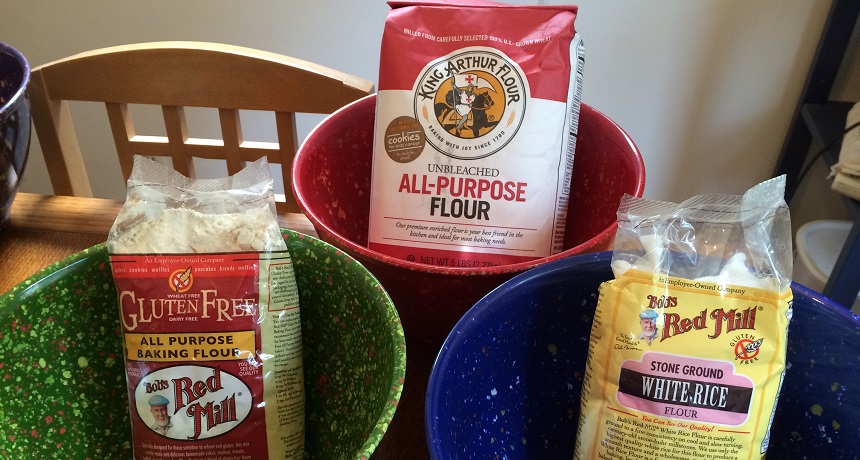Cookie Science 2: Baking a testable hypothesis
Using cookies recipes, I develop a hypothesis you can test in any kitchen

When designing a scientific experiment, it’s important to have an idea you can test by changing just one variable at a time. For cookie science, I will start by looking at different kinds of flour.
B. Brookshire/SSP
Share this:
- Share via email (Opens in new window) Email
- Click to share on Facebook (Opens in new window) Facebook
- Click to share on X (Opens in new window) X
- Click to share on Pinterest (Opens in new window) Pinterest
- Click to share on Reddit (Opens in new window) Reddit
- Share to Google Classroom (Opens in new window) Google Classroom
- Click to print (Opens in new window) Print
This article is one of a series of Experiments meant to teach students about how science is done, from generating a hypothesis to designing an experiment to analyzing the results with statistics. You can repeat the steps here and compare your results — or use this as inspiration to design your own experiment.
Welcome back to Cookie Science, where I’m using cookies to show you that science can be both close to home and quite delicious. I’m going to take you through finding a hypothesis, designing an experiment to test it, analyzing your results and much more.
To design an experiment, we need to start by defining a goal. What concept do we want to understand? What do we want to achieve? In my case, I would like to share a cookie with my friend Natalie. Unfortunately, it’s not as easy as handing her a cookie.
As I noted in part 1, Natalie has celiac disease. Whenever she tries to eat something with gluten in it, her immune system attacks her small intestine. This causes her a lot of pain. Right now, the only thing she can do about it is avoid gluten.
Gluten is a pair of proteins found in grains such as the wheat used in baking flour. So this means that flour — and a cookie made from it — are off limits. My goal is to take my favorite cookie recipe and change it into something with gluten-free flour that Natalie can enjoy.
This is a fine goal. But it is not a hypothesis. A hypothesis is an explanation for something occurring in the natural world, from inside Earth to inside our kitchens. But a hypothesis in science is something more. It is a statement that we can prove to be true or false by testing it in a rigorous way. And by rigorous, I mean by changing one factor after another, test-by-test, to measure if and how each change affects the outcome.
“Making my recipe gluten-free” is not a testable hypothesis. To come up with an idea I could work with, I had to do some reading. I compared six cookie recipes. Three contain gluten:
- The Chewy (by Alton Brown)
- Chewy Chocolate Chip Cookies (from Food Network Magazine)
- Chocolate Chip Cookies (from Food Network Kitchen).
Three similar sounding recipes contain no gluten:
- Gluten-free Double Chocolate Chip Cookies (by Erin McKenna)
- Soft & Chewy Gluten-Free Chocolate Chip Cookies (by the Minimalist Baker).
- Gluten-free Chocolate Chip Cookies {The Best!} (by Cooking Classy)
When I read the ingredients list for each recipe carefully, I noticed something. Gluten-free recipes for cookies generally do not just substitute gluten-free flour in place of wheat flour. They also add something else, such as xanthan gum. Gluten is an important ingredient. It gives wheat products their nice spongy texture, something critical for a nice, chewy chocolate chip cookie. It is possible that without gluten, a cookie has a different texture.
Suddenly, I had a hypothesis I could work with.
Hypothesis: Substituting gluten-free flour alone into my cookie dough will not make a cookie that is comparable to my original recipe.
This is an idea that I can test. I can change one variable — gluten-free flour in place of wheat flour — to find out if that changes the cookie and alters its taste.
Come back next time, as I move toward baking up my experiment.
Follow Eureka! Lab on Twitter
Power Words
hypothesis A proposed explanation for a phenomenon. In science, a hypothesis is an idea that hasn’t yet been rigorously tested. Once a hypothesis has been extensively tested and is generally accepted to be the accurate explanation for an observation, it becomes a scientific theory.
gluten A pair of proteins — gliadin and glutenin — joined together and found in wheat, rye, spelt and barley. The bound proteins give bread, cake and cookie doughs their elasticity and chewiness. Some people may not be able to comfortably tolerate gluten, however, because of a gluten allergy or celiac disease.
statistics The practice or science of collecting and analyzing numerical data in large quantities and interpreting their meaning. Much of this work involves reducing errors that might be attributable to random variation. A professional who works in this field is called a statistician.
variable (in experiments) A factor that can be changed, especially one allowed to change in a scientific experiment. For instance, when measuring how much insecticide it might take to kill a fly, researchers might change the dose or the age at which the insect is exposed. Both the dose and age would be variables in this experiment.







